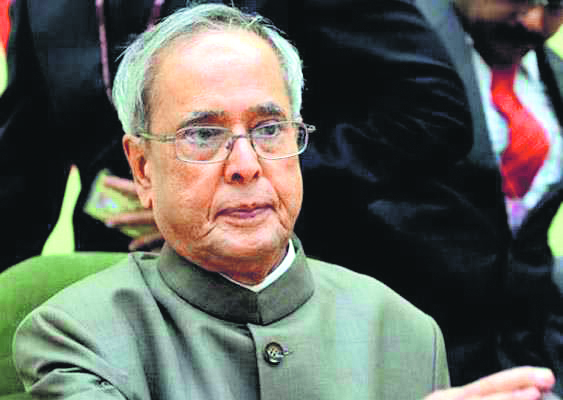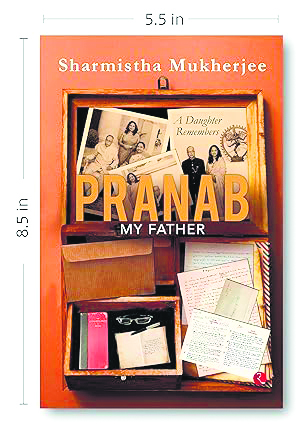A daughter’s remembrance of her father, one of the finest politicians in India, has set the proverbial cat among pigeons. Sharmistha Mukherjee, daughter of the late President Pranab Mukherjee knows her father very well, it was evident when she wrote a column for a special edition we had planned for Pranab Mukherjee. It was full of anecdotes, including a line where the father jokingly called the daughter a “bandit”.
Like many Bengalis in Delhi, I cannot claim I know the family but I had some interesting interactions. Sharmistha’s mother’s last prayers in Durga Puja were at our home, and her maternal uncle was my classmate. I met him a couple of times at the Rashtrapati Bhavan and he would always tell me the presidential palace was full of ghosts. So much so that it disturbed Pranab Mukherjee as well. I didn’t believe a word of it though the place looked spooky at night.

So, let’s revert back to the book that has caught the city by storm. Pranab, My Father: A Daughter Remembers has hit the bookstores in style and hit the Congress party where it hurts most. The party is rattled by the recent debacle in three states and Rahul Gandhi is unable to understand what went wrong. And then came this book. I am not sure whether the tome was strategically released by Rupa Books. But comments from Sharmistha have been sentimental and strong, especially when she recounts her conversations with her father where he said he knew he would not be made the Prime Minister. Why it did not happen only the Congress high command can answer. I can only read what is there in the book. Despite the full support from colleagues in the Congress and other parties in the coalition, the then-president of the grand old party, Sonia Gandhi decided to step aside from the race for the PM’s chair. Gandhi’s renouncement impressed Mukherjee but he genuinely felt let down by her treatment of him.
Let me run through the lines in the book. The daughter asked her father if he would become the PM and Mukherjee said without batting an eyelid that he would not be made the PM and the chair was reserved for Dr Manmohan Singh. Writes the daughter: “If Pranab harboured any disappointment about not being named the PM, it did not reflect in his diaries. He told journalist Suman Chattopadhyay that he did not have any expectations from Sonia to make him the PM. If there is no expectation, there is no disappointment as well.”
In repeated interviews, Sharmistha – she left active politics two years ago—has justified why her father had little tolerance for what he called the silly mistakes of the Congress party. And why the top leadership would, time and again, ignore people with an independent bent of mind. And writing in the same fervour, Sharmistha talks fondly of the relationship between her father and Narendra Modi. The PM often visited Pranab Mukherjee at Rashtrapati Bhavan and sought advice on a host of constitutional issues but rarely discussed politics. Probably they did but it does not find any mention in the book. And yes, the Congress never liked the bonhomie between the president and Modi. This is sad, ostensibly because the book makes it clear that Mukherjee never liked the “de-Nehrufication” of the current government, and at the same time he did not like the constant Savarkar-bashing by Rahul. “He also mentioned the physical torture that Savarkar endured while imprisoned in Cellular jail in Port Blair, and insisted that under such extreme duress, if someone wrote mercy petitions, Pranab could not term him as a ‘traitor’.”
The book explains why Mukherjee was a very positive person and why he worked brilliantly in the cabinet after Rajiv Gandhi was sworn in as the PM. Mukherjee gave confidence to Rajiv when the latter assumed the top chair, political cognoscenti say it was a great help. The Congress acknowledged it. But the cord snapped later. Why? The book explains it all. Like a genuine boxer, Mukherjee took it on his chin and moved on. He had been inspired by his daily recitals of Goddess Chandi, and also Rabindranath Tagore.
The book is full of Mukherjee’s illustrious life with anecdotes from the former President’s diary entries and personal stories narrated to his daughter. Mukherjee felt Rahul was “full of questions” but “yet to mature politically”, something Sharmishtha has reiterated time and again in her television interviews. And also the incident when Rahul landed up at the presidential home during the morning and interrupted Mukherjee during his morning walk when he was to visit the president in the evening. And then, the writer recounts how her father advised Rahul to join the cabinet
In another chapter, Sharmishtha mentioned how Mukherjee wrote about a particular incident in 2013 when Rahul tore up an ordinance that attempted to shield lawmakers who had been convicted in criminal cases. “He has all the arrogance of his Gandhi–Nehru lineage without their political acumen….The party’s vice-president had shown such disdain for his own government publicly. Why should people vote for you again?’’ the book cites Mukherjee as having written in his diary. Now supporters of the Congress see the book as a shipload of criticism, And the Congress – it never likes criticism – has seen it as a hint of Sharmistha jumping ship and joining the BJP. No one knows if this will eventually happen.
Let’s dig deeper. And let’s take a look at the cordial but interesting relationship between the Gandhis and Pranab Mukherjee. After Indira Gandhi’s assassination in 1984, names of P.V. Narasimha Rao or Pranab Mukherjee, senior most members of the Cabinet, were proposed by veteran Congress leader A.B.A. Ghani Khan Choudhary for the head post. But Mukherjee, claims the book, said there was no problem if a non-Cabinet member such as Rajiv Gandhi became PM. It showed Mukherjee knew the mind of the Gandhis and also of the Congress. In short, he knew what the two expected. And then, the book says the following: “Rajiv then asked, ‘Do you think I can manage?’ Pranab replied, ‘Yes, you can. Besides, we are all there to help you. You will have everyone’s support.” That’s what, Sharmistha explains in the book, was her father, a person with a broad mind.
Mukherjee, claims the book, accepted what the party offered. The book says Rajiv Gandhi had asked his preference for ministry and Pranab had asked for home or external affairs indicating home would be the first choice. But later, he was left bewildered when he was given the defence portfolio. Well, we are discussing Mukherjee who had worked with three generations of Gandhi family and held top ministries over an illustrious career spanning decades.
Sharmistha had an interesting conversation, the book, with her father and asked him if he had any regrets. True to his style, Mukherjee recited from Tagore:
Majhe majhe bote chhhidenchhilo taar
Tai niye ki ba kore hahakar
Shur tobu legechilo bare-bar
Mone pare tai aji
Ki paini tari hishab milate mono mor nahe raaji.
It translates:
Oft the strings did break
But fret not for that
Remember the melodies that played
Of the sum game of life today
Grieve not O soul
For the unattained.
What makes a great leader? Courage? Trustworthiness? Empathy? Mukherjee had all. The Congress must explain why he did not get what he deserved. Great read, wish it also had some of the writings that got lost from a basement.

